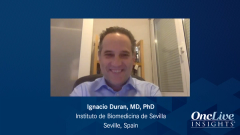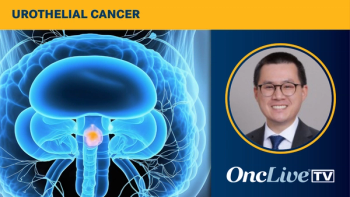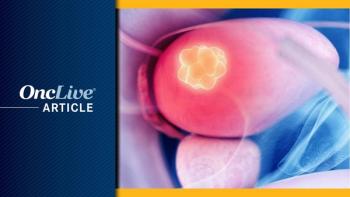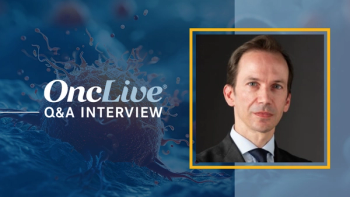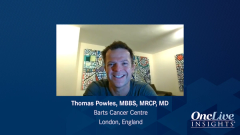
Practical Advice on Use of Maintenance Therapy in mUC
Practical advice on maintenance therapy in metastatic urothelial carcinoma, covering patient education, duration of therapy, and clinical guidelines.
Episodes in this series

Transcript:
Thomas Powles, MBBS, MRCP, MD: There’s been another maintenance trial with pembrolizumab with a very similar trial design. It’s a randomized phase 2 study with much smaller numbers. The trial also shows a PFS [progression-free survival] advantage. It shows a similar tolerability profile, but that PFS advantage was across...groups of patients, as you would expect. There wasn’t a survival advantage in that small randomized phase 2 study. Actually, randomized phase 2 studies aren’t designed to show survival benefit. It reinforces the fact that avelumab is associated with this advantage for PFS and indeed for OS [overall survival].
Remember, we haven’t shown PFS advantages for immune checkpoint inhibitors in the first- or second-line setting where the cancer is growing quickly. The reason why, as I said previously, is immune checkpoint inhibitors are not particularly good at turning the cancer around. If a cancer is growing quickly in unselected patients, then immune checkpoint inhibitors can struggle to turn that around in the majority of patients. But if the cancer is already under control and stable, immunotherapy is good at maintaining it, which is why these drugs are getting positive results in this setting.
One of the practical questions I’m asked frequently is when 1 approaches this. We’ve gotten into the habit of saying to patients, “We’re going to give you up to 6 cycles of chemotherapy, and then we’ll do a scan at 3, a scan at 6, and at 6 we’ll call it a day.” When you say to patients that the median progression-free survival is about 3 months after completion of that chemotherapy, my experience is that patients are disappointed. Inevitably, if patients have had 6 months of chemotherapy or 5 months, many of them are hoping for a much longer period before the cancer is regrowing.
It’s important from a patient perspective—patient groups tell me this—to have their cancer under control. Therefore, I approach this as part of first-line therapy. I say to patients, “We plan to give you chemotherapy up 6 cycles. After completion of chemotherapy, provided the cancer isn’t growing, we’ll switch you to maintenance avelumab and try to get control of the disease.” That way, there’s a discussion about how long the maintenance avelumab should continue. My current position is at least 2 years. I found it hard to stop patients who have done really well who have continued past that.
The treatment works in patients irrespective of their response to chemotherapy-stable disease, partial response, or complete response. Even in complete responders, their progression-free survival is only 4.5 months. All patients are potentially in harm’s way should be starting this therapy. Once patients have been told the beginning the treatment strategy, as is the case in kidney cancer and prostate cancer, they are very accepting that they need long-term treatment to get control of their disease.
One challenge with introducing the concept of the completion of chemotherapy is that many patients will build up hope that they won’t need to have further treatment. Many patients struggle with chemotherapy, and introducing a new drug at that time can be challenging. It’s important to remember that the maintenance period is seen…and that the switch to maintenance therapy is a much easier journey than the last 2 cycles of chemotherapy.
There’s a debate about how much chemotherapy is required. We did podcast recently with Dr Dean Bajorin, Dr Brian Rini, and myself, and Dean talked about the development of the number of cycles of chemotherapy in urothelial cancer. When they started, they kept going, but unfortunately that resistance occurred. They cropped it back to 6, and that’s largely because 6 cycles were being used in other cancers. It’s not a hard science of 6 cycles of platinum-based chemotherapy.
If patients are in harm’s way, particularly after 4 cycles, it’s reasonable to do 1 delay or 1 dose reduction. But once you’ve done that, if that hasn’t helped and the patient is still struggling, you’re probably better off giving 4 or 5 cycles—rather than 6, rather than these long-delayed protractions—and then switching to immunotherapy quickly. I’ve discovered that in those last 3 cycles, if you’re not giving chemotherapy properly, the cancer regrows. The key is to avoid progression. When progression occurs in metastatic urothelial cancer, you’ll lose control much quicker than you’d like. That’s certainly my experience.
There are recent guidelines from the NCCN [National Comprehensive Cancer Network], ESMO [European Society for Medical Oncology], and EAU [European Association of Urology]. They’re all relatively aligned, and they’re aligned with the fact that chemotherapy is the best way of getting control in unselected patients. They’re aligned with the fact that the PD-L1 biomarker has not performed well to date. They’re also aligned with the fact that maintenance avelumab is the right approach for the majority of patients whose cancers haven’t progressed on chemotherapy. There are some contraindications, of course, to immunotherapy—active autoimmune disease, for example. But in my experience, the vast majority of patients are eligible to receive maintenance avelumab. Actually, when patients are explained why it’s important and the lethality associated with unchecked metastatic urothelial cancer, the vast majority are keen to receive it.
Transcript edited for clarity.


